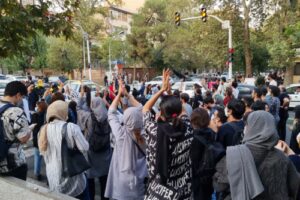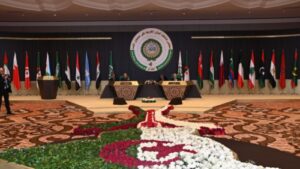
The National Interest Foundation Newsletter
Issue 167, November 3, 2022
Welcome to our NIF Newsletter. In this week’s headlines: we provide analysis into some of the key United States Senate races to watch as we approach U.S. midterm elections next Tuesday and their potential foreign policy-related implications, the results from Israel’s fifth election in less than four years highlight an alarming rise of the extreme far-right, Iran plans public trials of detained citizens in an effort to suppress weeks of anti-government protests while large-scale demonstrations persist, and the 2022 Arab League summit takes place in Algeria with leaders expressing that the Palestinian cause remains a central issue of concern.
Analysis of Key U.S. Senate Midterm Elections

A handful of hotly-contested Senate races this cycle will be instrumental in determining the chamber’s future leadership and direction. (Photo from AP)
Analysis into Key United States Senate Races to Watch as We Approach U.S. Midterm Elections Next Tuesday and Their Potential Foreign Policy-Related Implications
Next week, voters in U.S. midterm elections will put an end to months of anticipation about the fate of the Senate, which Democrats currently control only because of U.S. Vice President Kamala Harris’s position as the de facto tiebreaker. A net gain of one seat for Republicans will grant them control of the chamber, but the path to victory is difficult, as they already own 21 of the 35 seats up for grabs. Adding to their problems is the fact that every seat currently held by a Democrat on the ballot is in a state won by Joe Biden in the 2020 presidential election. On the other hand, the Wisconsin election features incumbent Republican Ron Johnson against challenger Mandela Barnes in a state that Biden also won, which has made for a toss-up in the Midwestern state, according to recent Politico analysis. The same report indicates that there are four other toss-up races, and that whichever party wins three of the five will control the Senate, barring an upset. One such race is taking place in Georgia and consists of incumbent Democrat Raphael Warnock against former NFL star and University of Georgia alumni Herschel Walker. Of late, this race has been clouded by scandal, with evidence suggesting that Walker paid a former girlfriend to get an abortion in 2009, in contrast to his staunchly pro-life rhetoric. Despite controversy, the race is incredibly close. A poll published on Monday by the New York Times and Siena College found that Warnock leads Walker 49-46, while an Atlanta Journal-Constitution/UGA poll published the same day found that the two were tied at 45-45. In Nevada, where Republican Adam Laxalt is taking on incumbent Democrat Catherine Cortez Masto, NYT/Siena polling found that race to be tied as well, at 47-47. However, a poll released on Tuesday by The Hill and others found that Laxalt leads by five points, 50-45. The other races to watch are Arizona and Pennsylvania, where Democrat John Fetterman has been struggling to cognitively recover from a stroke. The NYT/Siena poll gives Fetterman a five-point lead on Republican opponent and former TV personality Mehmet Oz, whereas a Muhlenberg College-Morning Call survey declared the race deadlocked on Wednesday.
Whether control of the U.S. Senate goes to the GOP or to Democrats following the upcoming election will most immediately have an impact on domestic issues. Inflation, crime, abortion, and immigration are dominating every candidate’s platform. Foreign policy is unlikely to be changed while President Biden is in office. However, a Republican-controlled Senate may look to set the table for a Republican president in 2024. Notably, foreign policy is a particularly interesting topic in relation to the Senate because its members hold certain constitutional duties that House members do not, such as approving treaties and presidential appointments. Although treaties are almost always circumvented by executive orders in the present day, there is evidence in recent years amidst rising partisanship that senators are beginning to use the power to reject presidential appointments more often. The Senate refused to approve three appointees of both President Trump and President Obama. Previously, three or more withdrawals or rejections of appointees had only taken place during the Clinton and early 1840s Tyler administrations. Some appointees, like Secretary of State and Secretary of Defense, play crucial foreign policy roles. Rejection or withdrawal is unlikely, but of course, possible. In any case, presidents must consider the possibility of rejection when they make their selections. In addition to confirming appointments, the Senate is also home of the powerful Senate Foreign Relations Committee, which has a large say in U.S. foreign policy. It is customary that whichever party holds the Senate as a whole also places a majority of its members on each committee and names its most senior member on each as its chair.
On a more general level, Senate legislation going forward will vary greatly depending on who is in control. A Democratic president in 2024 backed by a Democratic Senate would hope to pass legislation aimed at collaborating with other countries militarily, economically, and diplomatically via climate change resolutions, financial aid, more open borders, and a nuclear deal with Iran. Of course, a likely Republican House would complicate these moves. On the contrary, a Republican Senate and House aligned with a Republican president would be able to make large-scale changes of the opposite nature. They would likely want to place emphasis on domestic issues and remove the U.S. from many international agreements and initiatives. Regarding current foreign policy, the United States’ role in the war in Ukraine and our handling of China still have substantial bipartisan support, although Republican support for Ukraine may be waning in the face of economic recession. Even so, amending support for Ukraine would likely take months.
Israeli Election Highlights an Alarming Rise of the Extreme Far-Right

Extreme far-right parties and figures are expected to be a significant part of the new Israeli coalition government. (Photo from Reuters)
The Results from Israel’s Fifth Election in Less than Four Years Highlight an Alarming Rise of the Extreme Far-Right
This week, Israel held its fifth election in less than four years, with the projected results underlining a troubling rise of the extreme far-right. It is now anticipated that criminally-indicted former Prime Minister Benjamin Netanyahu will return to power as head of a new far-right coalition government. This is alarming on multiple fronts, as not only is Netanyahu under ongoing investigation for serious criminal charges with analysts pinpointing his blatant intentions to manipulate the justice system and attempt to dodge prosecution, but the new coalition is slated to include extremist and bigoted political figures such as Itamar Ben-Gvir and other heads of the Jewish supremacist Religious Zionism party. Some experts have outlined how their inclusion as potential ministers has already stirred controversy, with indications, for example, that the Biden administration is unlikely to engage with officials like Ben-Gvir. There is also understandable concern that a new Israeli coalition government which is comprised of this multitude of members with discriminatory and hateful viewpoints towards Palestinians will serve a destructive role in only fueling more violence and injustice.
Itamar Ben-Gvir and Bezalel Smotrich are two of the political figures expected to be involved in the new Israeli coalition government that have drawn particular distress from peace and social justice activists. Ben-Gvir is an extremist and Jewish supremacist who espouses Kahanist ideologies and is now set to become a minister in the soon-to-be new coalition government. He has been described as an extreme far-right provocateur, and has been convicted of inciting racism, destroying property, and supporting terror organizations. Ben-Gvir wants to expel what he deems to be “disloyal” Palestinian citizens of Israel, despite him offering no clear explanation as to what classifies one as such. Additionally, Bezalel Smotrich, leader of the Jewish supremacist Religious Zionism party, is also due to be a critical member of the new coalition government. Like Ben-Gvir, Smotrich holds radical and bigoted views, having advocated for a shoot-to-kill policy for the Israeli military against Palestinian protesters and even for the separation of Jewish and Arab mothers in hospital maternity wards. His hateful sentiment towards Palestinians also includes a belief that they are inferior to Jewish citizens of Israel.
Netanyahu himself is now anticipated to regain power despite facing a serious and ongoing criminal corruption trial, which also presents major concerns regarding his potential ability to manipulate and circumvent justice. He has been under fire and scrutiny for egregious charges of corruption which include breach of trust, deception, and receiving bribes. He rejected the widespread calls to step down after he was indicted, instead using his position of power as prime minister to lash out at law enforcement, the media, and the courts – claiming that they were conducting a “witch hunt” against him. Thus, now, observers again fear that he will use his position of authority to hinder the criminal trial and investigation. In fact, Smotrich has proposed a slew of new laws to strip the justice system of some of its powers and alter the criminal code.
This latest Israeli election highlights the unsettling rise of the extreme far-right and the growing support for these groups. Most troubling of all is the support they hold amongst even young Israelis. Polls indicate that an estimated 70% of Israeli youths aged 18 to 24 identify as right-wing. The results of the election are disturbing because they demonstrate the extent to which these bigoted and anti-democratic entities, whose leaders advocate for undermining justice and expelling Palestinians deemed “disloyal,” among other destructive things, have seen a rise in support. The extremist Religious Zionism slate, for example, is projected to win at least 14 Knesset seats compared with around 6 in previous rounds of elections.
Anti-Government Protests Persist in Iran

Protests have continued despite the Iranian government’s attempts to suppress them. (Photo from Getty Images)
Iran Plans Public Trials of Detained Citizens in an Effort to Suppress Weeks of Anti-Government Protests While Large-Scale Demonstrations Persist
Following the suspicious circumstances surrounding the detainment and death of Iranian woman Mahsa Amini back in mid-September, mass anti-government protests have been taking place across the country. For weeks, an array of Iranian citizens have been demonstrating against authorities and the so-called “morality police” behind the killing of Amini. She was taken into custody for allegedly violating the dress code, with eyewitnesses stating that Amini was severely beaten and died as a result of police brutality, refuting authorities’ claims aimed at absolving themselves of wrongdoing. The large-scale protests initially began over outrage regarding the incident and abrupt fuel price increases, but quickly transformed into broader popular discontent with the government’s repression and corruption. Recently, earlier this week, Iranian authorities announced that they would hold public trials for thousands of people who have participated in the protests, and analysts have outlined how the mass indictments are the government’s first legal actions with the goal of suppressing dissent since the unrest broke out approximately six weeks ago. Some Iranian officials have also claimed that “foreign enemies in the West” have encouraged the unrest. According to human rights groups, at least 270 people have been killed and more than 14,000 have been arrested.
Iranian authorities have demonstrated their fears of the protests extending a longer period of time, as they have gone out of their way to suppress those who participate. The widespread demonstrations have lasted more than a month and solidarity with them has spread to over 104 cities, and around the world. During this preceding period of time, the government has failed to report the total number of deaths and arrests taking place. They have confronted the protests with astonishing levels of violence, and have threatened families of victims and imposed a near-total internet shutdown in November. Internet shutdowns violate basic human rights, including the rights to freedom of expression, access to information, and peaceful assembly and association. Under standards of international human rights laws, Iran should not use indiscriminate shutdowns to curtail the flow of information or harm citizens’ ability to assemble or express their sociopolitical views.
The government has also gone out of its way to hide the full extent of the crackdown that was imposed on protesters, with even the number of victims being difficult to pinpoint. Authorities have also detained at least 35 reporters and photographers since the demonstrations began. Videos of the protests show that on several occasions, security forces shot at people who were fleeing the demonstrations. Many of those wounded during the protests would not seek hospital treatment out of fear of arrest. Some of the worst violence has taken place in Khuzestan Province, where authorities responded to roadblocks set up by protesters and reacted with heavy weaponry and lethal force.
In an attempt to suppress and deter protests, authorities have announced charges against thousands of people across a plethora of Iranian provinces. Many have been accused of broad and dubious charges like “corruption on earth” and “war against God,” offenses that carry the death penalty. Families of those arrested have also been banned at the threat of retaliation from speaking and conducting interviews with the media.
2022 Arab League Summit in Algeria

Arab leaders from across North Africa and the Middle East met to tackle key issues, including the Palestinian struggle for social justice. (Photo from Reuters)
The 2022 Arab League Summit Takes Place in Algeria with Leaders Expressing that the Palestinian Cause Remains a Central Issue of Concern
On Tuesday and Wednesday of this week, the Arab League convened for the first time since before the COVID-19 pandemic with a full agenda. Most important among these were discussions around the circumstances in Palestine and Israel, a topic that has often taken center stage at the annual conference. One would have expected division over how to handle the Israeli-Palestinian conflict to be at an all-time high this year. Since the group last met, the United Arab Emirates, Sudan, Bahrain, and Morocco have all signed the Abraham Accords with Israel, which has enabled the formation of diplomatic ties between Israel and several Arab governments despite continued Israeli oppression of Palestinians and an absence of fair concessions. However, the reality was that participants largely evaded the subject, even as Israel appears to be ushering in one of the most far-right and extremist governments in its history. Led by former Prime Minister Benjamin Netanyahu, the new government is expected to crack down further on Palestinian rights and entrench illegal occupation. There was no discussion of the Israeli election, either. Instead, delegates called on Israel to stop their encroachment and violence against Palestinians and pledged support for Palestine without making any official moves or debating controversial material.
In addition to prospective diplomatic engagement with Israel based on the status quo of continued illegal Israeli occupation, Arab League members are also deeply divided on a number of other topics about which they refused to have conversations. For instance, Algeria and Morocco are not only divided on the issue of relations with Israel, but also on the autonomy of Western Sahara, a region of Morocco that has vied for statehood for years. Algeria supports Western Sahara’s existence, whereas Morocco signed the Abraham Accords with Israel partially because there was a clause that the United States would officially reject Western Sahara. Other points of disagreement amidst the Arab nations that went unmentioned were Syria’s suspended membership in the League, as well as how best to handle regional powerhouses Iran and Turkey.
Still, there were some fruitful discussions at this week’s summit. The war in Ukraine has been especially damaging to the food and energy supplies of Arab League countries, many of whom heavily rely on Ukraine for grain. The resulting crises were discussed at length, but members ultimately agreed to remain neutral in the conflict. Unfortunately, no idea was put forward as to how to handle the food and energy crises in the meantime. Participating members also discussed the spread of drought and famine across the region, especially in Somalia, where this has had devastating humanitarian consequences.
Enter the text or HTML code here
